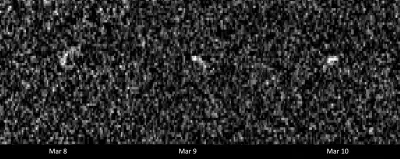
Asteroid Apophis won't hit Earth in 2068: NASA
text_fieldsNASA has ruled out the chances of asteroid Apophis impacting Earth in 2068 and clarified that it shall not pose any threat to the planet in at least a century.
The asteroid, discovered in 2004 and estimated to be 340 metres across, was initially assumed to come close to Earth in 2029, an assumption later discarded. It was then expected to impact in 2036 and then further in 2068. NASA ruled out the assumptions after a new radar campaign combined with precise orbit analysis was conducted with the help of a 70-metre radio antenna at the Deep Space Network's Goldstone Deep Space Communications Complex near Barstow, California, around March 5th when Apophis made a distant flyby of Earth.
"A 2068 impact is not in the realm of possibility anymore, and our calculations don't show any impact risk for at least the next 100 years," Davide Farnocchia of NASA's Centre for Near-Earth Object Studies (CNEOS) said.
"With the support of recent optical observations and additional radar observations, the uncertainty in Apophis' orbit has collapsed from hundreds of kilometres to just a handful of kilometres when projected to 2029. This greatly improved knowledge of its position in 2029 provides more certainty of its future motion, so we can now remove Apophis from the risk list," they added.
"Although Apophis made a recent close approach with Earth, it was still nearly 17 million kilometres away. Even so, we were able to acquire incredibly precise information about its distance to an accuracy of about 150 metres," said Marina Brozovic, the JPL scientist who led the radar campaign.
"This campaign not only helped us rule out any impact risk, it set us up for a wonderful science opportunity," Marina adds.























